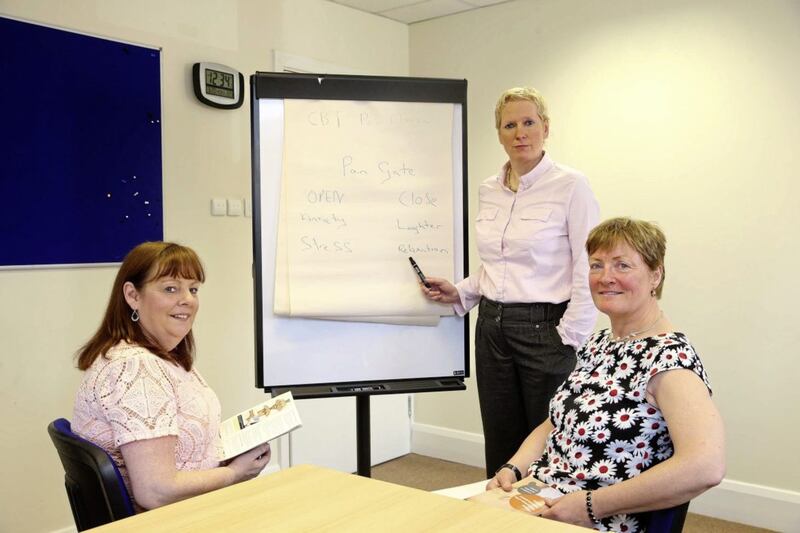WHEN Ann McPartlan's knees were aching and the pain was unbearably real, the last thing she wanted to think was that, maybe, it was all 'in her head'. For people like her, living with chronic pain day-in, day-out, it's never simply a case of mind over matter – or is it?
The Lisburn woman is the first to admit that she was more than a little sceptical when first approached about using cognitive behavioural therapy (CBT) to manage her pain for rheumatoid arthritis in a ground-breaking new approach being trialled at Grosvenor Road Surgery in Belfast.
"I have worked for BT for 32 years and the only CBT that I was aware of was Computer Based Training," she says, laughing at the memory. "It's fair to say I was totally unaware of CBT for pain management, which made its impact on my life all the more surprising."
Despite initial reservations, Ann (54) was one of several open-minded Belfast patients willing to "give it a rattle" as she puts it, and, for her, the results have been "astounding" and even "life-changing".
It is important to stress at this stage that the therapy, better known for its benefits in changing negative thinking patterns for people suffering from anxiety and other mental health issues, is not being billed as some sort of magic wand which can make pain miraculously disappear. It is, rather, a technique to be taught and used alongside any necessary prescribed painkillers.
The word 'painkiller' itself is a frustrating misnomer for Grosvenor Road GP Dr Rose McCullagh, who along with Dr Linda Kelly, has taken a special interest in CBT for pain management and selected patients who could benefit most.

"People read the word painkiller and think it really does kill the pain," she says. "They should be renamed pain reducers and then patients would have more realistic expectations."
The move to look at offering something additional to conventional medication was prompted by the high number of patients at the surgery suffering from chronic pain and the almost exclusive reliance on drugs as a means of relief.
"Pain management is a big issue for a lot of people who are dealing with everything from a sore hip to broken limbs and long-term, complex medical conditions," Dr McCullagh says. "Consequently, painkillers are a big problem, with risk of side effects when taken over a long period of time."
So, when funding became available, Dr McCullagh and the team were delighted to be the first surgery in Northern Ireland to trial CBT for a number of their patients suffering chronic pain, organising three separate six-week group courses as well as therapy for two patients on an individual basis.
Results were highly positive and the initiative earned the surgery the 'GP/Pharmacist partnership' accolade in the recent NI Healthcare Awards. The award specifically recognised the work of Dr McCullagh, pharmacist Bernard Brannigan and therapist Elizabeth Fitzpatrick in the use of cognitive behavioural therapy in pain relief management.
The courses have now finished but their impact is still rippling out across other areas, with Dr Kelly extolling the benefits of CBT on a GP pain forum and Dr McCullagh using a CBT approach in daily surgeries.
A form of 'talk therapy', CBT helps people identify and develop skills to change negative thoughts and behaviours, working on the basis that individuals – and not outside situations and events – create their own experiences, pain included. That doesn't mean the pain goes away, but it does mean a person practising CBT can focus on it less and so cope with it better.
"Basically, it allows a different perspective," Dr McCullagh says. "There has been a lot of interest and I'm hopeful we can get more funding to run more courses which will benefit more people in the future.
"In this morning's surgery I saw 22 patients and 14 were in pain and struggling because they felt unable to cope with things many of us take for granted – being able to carry grandchildren or climbing the stairs.
"Those feelings can also lead to anxiety, so a CBT approach really works and also feeds into the move towards a more patient-centred approach to treatment. I would love to see this rolled out across all surgeries in Northern Ireland."
For Ann, taking part in the course has helped her develop better coping strategies, but also also made her realise the importance of being more open about her condition to family and work colleagues.
"I think trying to ignore what was happening came from a fear of being seen as weak and also because I didn't want to burden others," she says. "Before, if someone had asked why I was limping, for instance, I might have bitten their head off, but now I'm more confident in accepting my limitations and working within them.
"The course teaches you to put yourself first and say 'no' sometimes, especially when trying to do everything is not a sensible option. It also teaches you not to be defined by your pain, to try new things and not be afraid that a new experience will make the pain worse.
"The best way I can put it is like this: the pain is still there, but I am able to take the 'helicopter view' and see the big picture. I can set the pain on the shelf and just take a look over at it now and then.
"I still take the same amount of medication, but I'm not so dependent on it and, when the pain is bad, I can manage to go on in spite of it."
Ann's experience is remarkably similar to another new CBT convert, Rose O'Connor from Belfast, who proved such an inspiring proponent of the therapy that she was asked to deliver the introductory speech to one of the sessions.
Having been diagnosed with MS in 2005 and also suffering from osteoarthritis in her neck, hand and knees – "and having no tolerance for painkillers" – Rose had tried various forms of alternative therapy, including acupuncture, which did not help.
When offered a place on the course, like Ann, she too was sceptical but had reached the stage where she "would give anything a go".
"It was definitely a positive experience and made me more aware of my own pain triggers, such as stress, as well as the very real power of positive thought," she says.
"The mind can take you to a lot of dark places, but this is a way of using the mind to travel back to the light. Since learning to use CBT for pain management, I can honestly say I am happier, more confident and feeling less isolated in my painful times."
In addition to the benefits of adopting a positive mindset, CBT can also change the physical response in the brain that makes pain worse, according to CBT therapist Elizabeth Fitzpatrick who developed and led the courses at Grosvenor Road Surgery.
"Pain can cause stress and stress can impact on certain chemicals in the brain like serotonin," she explains. "At the course, we talk about the triggers which open the pain 'gate', such as anxiety, stress and frustration, and what can close the 'gate' – relaxation, gentle activity and, importantly, laughter."
And it is an immense source of job satisfaction for Elizabeth that so many people have left her courses being able to laugh more.
"We did laugh," she adds, "and the response from people has been extremely positive. CBT may not have cured their MS, fibromyalgia or rheumatoid arthritis, but it did give them more confidence about coping with their condition."



